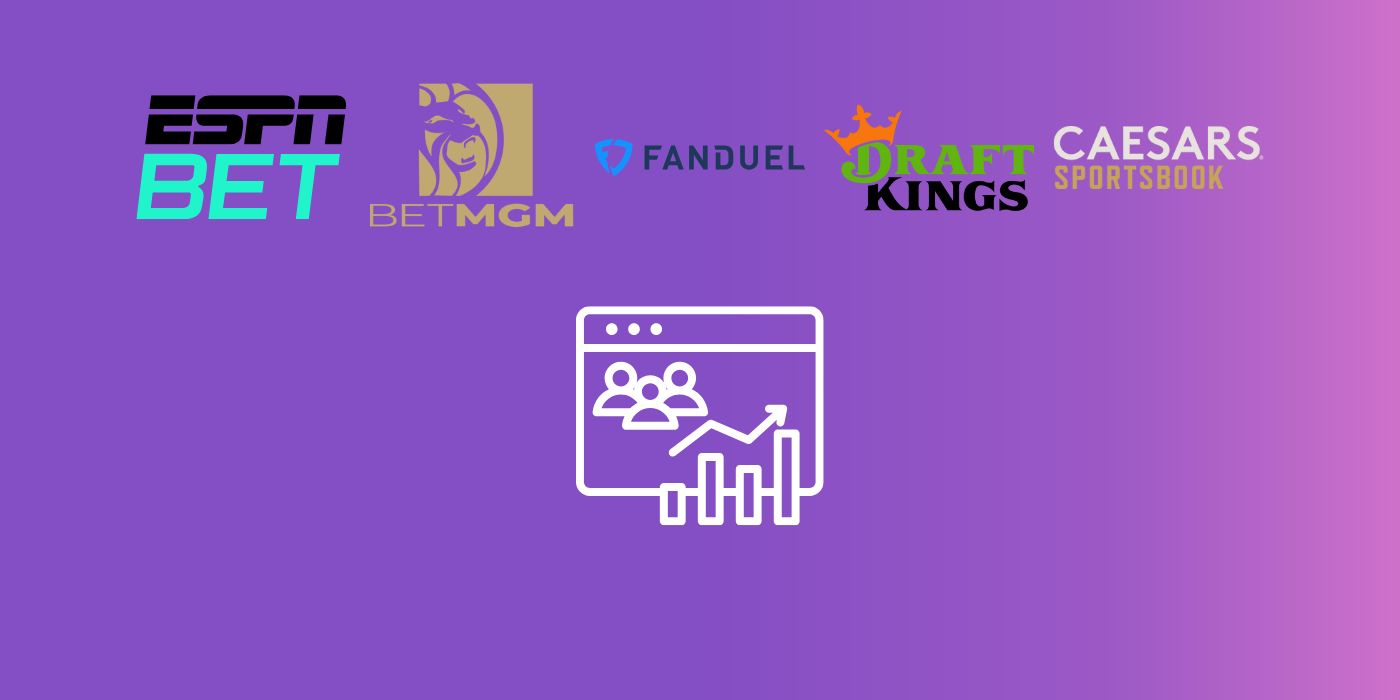How do the TOP 5 U.S. Sportsbooks get Traffic?

Who Are the Top 5?
To establish a clear foundation for this analysis, we begin by identifying the top five U.S. sportsbooks based on their 2024 annual revenue. This approach ensures that our comparison is grounded in financial performance, which reflects both market share and operational scale. While traffic data is also considered for context, revenue remains the primary metric for ranking.
The top five sportsbooks by revenue in 2024 are:
| Sportsbook | Revenue (2024) | Traffic (2024) |
| FanDuel | $5.729B | 172.3M visits |
| DraftKings | $4.768B | 173.2M visits |
| BetMGM | $2.102B | 42.93M visits |
| Caesars | $1.163B | 17.5M visits |
| ESPN Bet | $0.390B | 9.51M visits |
Source: SimilarWeb (traffic), Annual Reports (revenue)
While FanDuel leads in revenue, DraftKings slightly surpasses it in total traffic, indicating a strong user acquisition strategy. BetMGM, Caesars, and ESPN Bet round out the top five, each with a notable presence in both revenue and user engagement.
This ranking provides the framework for the remainder of the article, which will focus on analyzing traffic trends and acquisition strategies during the first half of 2025.
Overall Traffic Comparison
To understand the scale of user engagement across leading U.S. sportsbooks, we analyzed total website visits during the first half of 2025 (January through June). The data, sourced from SimilarWeb, offers a clear view of how each brand performs in terms of digital reach.
| Sportsbook Website | Total Visits (H1 2025) |
| draftkings.com | 76.56M |
| fanduel.com | 68.202M |
| betmgm.com | 20.933M |
| sportsbook.caesars.com | 6.261M |
| espnbet.com | 7.865M |
Source: SimilarWeb
DraftKings leads in overall traffic, with over 76 million visits in the first half of 2025, followed closely by FanDuel with 68 million. Despite FanDuel’s higher revenue in 2024, DraftKings’ superior traffic volume suggests a broader user base or more frequent engagement. BetMGM maintains a strong third position, while Caesars and ESPN Bet trail with more modest traffic figures.
This comparison highlights the importance of evaluating both revenue and traffic when assessing market position. While revenue reflects monetization success, traffic provides insight into brand visibility and user acquisition effectiveness.
Composition of Traffic Sources
Understanding how users arrive at sportsbook websites reveals the strategic emphasis each brand places on different acquisition channels. For this analysis, we examined traffic composition across six primary sources: Direct, Organic Search, Paid Search, Referral, Display Ads, and Social. While Email traffic was also tracked, its volume was negligible and excluded from comparative analysis.
| Domain | Direct | Organic Search | Paid Search | Referral | Display Ads | Social |
| draftkings.com | 52.5M | 15.9M | 1.3M | 3.5M | 64,500 | 3.4M |
| fanduel.com | 47.9M | 14M | 0.25M | 3.9M | 0.751M | 1.4M |
| betmgm.com | 13.5M | 4.9M | 0.617M | 1.3M | 72,500 | 0.512M |
| sportsbook.caesars.com | 4.3M | 0.261M | 27 | 1.7M | 633 | 53,500 |
| espnbet.com | 5.9M | 1.2M | 59,800 | 0.536M | 23,100 | 172,100 |
Source: SimilarWeb
Direct traffic dominates across all five sportsbooks, accounting for the majority of visits. This suggests strong brand recognition and habitual user engagement, particularly for DraftKings and FanDuel, which lead in this category.
Organic search is the second most significant channel, with DraftKings and FanDuel again leading, indicating robust SEO strategies and high visibility in search engine results.
Referral traffic plays a notable role for Caesars, contributing over 27% of its total traffic, likely driven by partnerships and affiliate networks. FanDuel also performs well in this category.
Display advertising shows a sharp contrast: FanDuel invested heavily in this channel, generating over 750,000 visits, while Caesars and ESPN Bet saw minimal traffic from display ads.
Social traffic is particularly strong for DraftKings, which leads with 3.4 million visits, followed by FanDuel and ESPN Bet. This suggests effective engagement on platforms like Twitter, Facebook, and Instagram.
Overall, the composition of traffic sources reflects each brand’s strategic priorities. DraftKings and FanDuel maintain a balanced mix across channels, while others rely more heavily on specific sources such as referrals or social media.
SEO
Search engine optimization (SEO) remains a foundational pillar in the digital acquisition strategies of leading U.S. sportsbooks. Organic search traffic not only reflects brand visibility and domain authority but also signals the effectiveness of iGaming content marketing, technical optimization, and long-term investment in discoverability. For operators looking to understand how to build visibility and scale organic reach, studying iGaming traffic patterns is essential.
Organic Traffic Overview (H1 2025)
| Sportsbook Website | Organic Search Traffic |
| draftkings.com | 15.9M |
| fanduel.com | 14M |
| betmgm.com | 4.9M |
| sportsbook.caesars.com | 0.261M |
| espnbet.com | 1.2M |
Source: SimilarWeb
DraftKings leads in SEO traffic, supported by a robust content ecosystem and technical SEO practices. Internal audits show that DraftKings has invested in optimizing meta titles with high-intent keywords like “bet online,” which Google interprets synonymously with “betting” their structured data usage, while not a direct ranking factor, helps communicate page context more effectively to search engines.
FanDuel, close behind, benefits from its branded content hub, The Duel, which serves as a central SEO asset. However, analysis reveals that FanDuel’s meta descriptions are often excessively long, leading to truncation in search results and potentially lower click-through rates. Despite this, FanDuel’s domain authority and consistent publishing cadence keep it competitive.
BetMGM shows moderate SEO performance, likely bolstered by its affiliation with MGM Resorts and cross-promotional content. However, its visibility lags behind the top two, suggesting opportunities to improve keyword targeting and content depth.
ESPN Bet, a newer entrant, has made notable progress with over 1.2 million organic visits. Its performance is likely enhanced by ESPN’s broader media ecosystem, which provides inherited authority and visibility. Still, its SEO footprint remains limited compared to more established competitors.
Caesars, with only 260,700 organic visits, appears to underinvest in SEO. This may reflect a strategic focus on paid and referral channels, but it also signals missed opportunities in capturing high-intent search traffic.
Strategic Insights
- Content Hubs & Branded Platforms: DraftKings’ DK Nation and FanDuel’s The Duel exemplify how branded content platforms can drive SEO success. These hubs consolidate topical authority and serve as landing zones for long-tail keywords.
- Technical SEO & Site Structure: DraftKings and FanDuel benefit from clean URL structures, fast page speeds, and mobile optimization, all critical for ranking in competitive verticals.
- Keyword Strategy: Both brands target a mix of branded and non-branded keywords, including betting guides, odds comparisons, and promotional terms. This diversified approach helps capture users at various stages of the funnel.
- Structured Data & SERP Enhancements: While not a direct ranking factor, structured data improves how content appears in search results. DraftKings and FanDuel use it to enhance visibility and click-through rates.
- Off-Site SEO & Link Building: Outreach efforts, including placements and partnerships, contribute to domain authority. DraftKings, for example, saw visibility boosts from NFL-related content and iGaming backlinks
In summary, SEO remains a competitive advantage for sportsbooks that invest in both technical infrastructure and content strategy. DraftKings and FanDuel continue to lead, while others like ESPN Bet show promise. Caesars, however, may need to reevaluate its approach to remain visible in organic search.
PPC (Pay-per-click)
Pay-per-click (PPC) advertising continues to be a strategic lever for U.S. sportsbooks seeking to capture high-intent traffic in a crowded digital landscape. The analysis of paid search volumes and keyword bidding behavior reveals distinct approaches among the top five operators. Integrating strategies like SEO and PPC working together has become increasingly important for maximizing overall acquisition efficiency.
DraftKings leads in paid search traffic with approximately 1.3 million visits, reflecting its robust investment in PPC campaigns. This aligns with its dominant share in high-volume generic keywords such as sports betting and bet365, where it captures 56.87% and 66.23% of competitive traffic, respectively. DraftKings’ strategy appears to focus on broad, high-intent terms that attract users across multiple stages of the conversion funnel.
BetMGM, while second in paid search volume with 616,900 visits, demonstrates a highly targeted keyword strategy. It owns 100% of the traffic for branded and localized terms such as mgm pa, mgm, stake us, and mgmcasino.pa, indicating a strong emphasis on brand protection and regional targeting. This precision targeting likely contributes to efficient conversion rates, even with lower overall traffic.
FanDuel, with 250,400 paid search visits, shows moderate engagement in PPC. It competes primarily on broader terms like sports betting and bet365, capturing 28.57% and 15.17% of traffic, respectively. This suggests a complementary strategy to its organic and referral channels, leveraging PPC to reinforce visibility in competitive spaces. For operators with similar ambitions, partnering with a specialized PPC agency can provide the expertise needed to optimize campaigns and scale efficiently.
ESPN Bet and Caesars Sportsbook register minimal paid search traffic, 59,800 and 27 visits, respectively. ESPN Bet does participate in competitive bidding for keywords like sports betting and bet365, securing 14.63% and 17.73% of traffic. Caesars, however, shows a negligible presence in PPC, indicating either a nascent strategy or reliance on alternative acquisition channels.
The keyword-level analysis highlights a clear divide in PPC tactics: DraftKings and BetMGM dominate through volume and precision, respectively, while FanDuel and ESPN Bet maintain selective engagement.
Social
Social media plays a multifaceted role in the digital acquisition strategies of leading U.S. sportsbooks. While not the primary driver of traffic, it remains a critical channel for brand engagement, community building, and real-time interaction, especially during major sporting events. For operators, investing in professional social media advertising services can amplify these efforts and ensure campaigns reach the right audiences at scale.
Traffic Volumes and Channel Strength
According to recent traffic data, DraftKings leads the pack with 3.4 million visits from social sources, showcasing its dominance in leveraging platforms like Twitter/X, Instagram, and TikTok. This volume reflects a mature social strategy that integrates influencer partnerships, live content, and promotional campaigns.
FanDuel follows with 1.4 million visits, indicating a strong but more targeted approach. FanDuel’s social presence is often tied to promotional offers and event-driven content, particularly around NFL and NBA seasons.
BetMGM registers 511,800 visits, suggesting a growing but less aggressive social footprint. Its strategy appears to focus on regional activations and partnerships, such as those with local teams and casinos.
ESPN Bet and Caesars Sportsbook trail with 172,100 and 53,500 visits, respectively. However, ESPN Bet’s relatively low social traffic belies its broader brand influence. Internal data shows that 72% of ESPN Bet’s traffic is direct, with 94% of that branded, indicating that ESPN’s media ecosystem drives substantial indirect engagement.
Strategic Insights from Industry Trends
Recent industry discussions, including those at SBC Digital Sportsbook, emphasize the growing importance of real-time communication and hyper-personalized offers in social engagement. Operators are increasingly using CRM tools to activate and retain users through dynamic social campaigns, odds boosts, and gamified content.
Moreover, external analyses highlight that localized marketing and content-driven engagement are key to social success in 2025. Top sportsbooks are tailoring their messaging to state-specific regulations and fan interests, using blogs, podcasts, and influencer collaborations to build trust and authority. Insights from iGaming SEO research, particularly The Ultimate Guide to Ranking iGaming Sites in 2025, also stress that integrating SEO-driven content with social strategies is becoming critical for achieving visibility and long-term growth.
Conclusions
The analysis of traffic sources among the top five U.S. sportsbooks reveals distinct strategic priorities and competitive strengths. DraftKings and FanDuel consistently lead in both overall traffic and channel diversification, leveraging robust SEO, paid search, and social media strategies to maintain high visibility and engagement.
BetMGM demonstrates effective brand protection and regional targeting through precision PPC campaigns, while Caesars relies heavily on referral partnerships to supplement its acquisition efforts. ESPN Bet, as a newer entrant, benefits from its parent company’s media ecosystem, driving substantial direct and branded traffic.
Direct visits remain the dominant source for all operators, underscoring the importance of brand recognition and habitual user behavior. Organic search and referral channels further differentiate market leaders, while paid and social strategies reflect varying degrees of investment and innovation.
As the industry matures, successful sportsbooks will continue to refine their digital acquisition mix, balancing immediate conversion tactics with long-term brand building and user retention.
Read our other articles

Top LLM SEO tools for AI search optimization


December 2025 Google Core Update: Impact & Insights for iGaming SEO


Top ChatGPT ranking factors in 2025: Everything brands need to know






